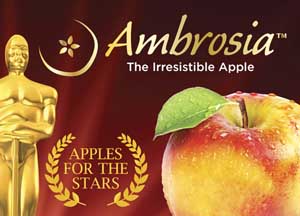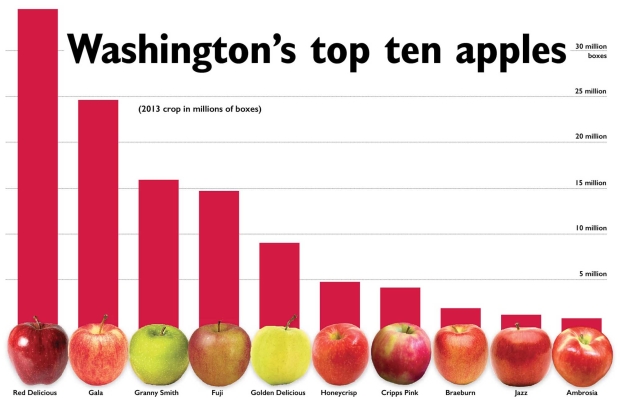
Ambrosia apples were included in official gift bags at the Academy Awards this year as a promotion. (Courtesy CMI)
Washington’s Ambrosia apple crop could reach one million boxes in the coming year. It is now the state’s tenth most important variety.
Ambrosia, which originated in Canada, has also moved towards the top of the managed varieties produced in Washington, ranking third after Pink Lady (Cripps Pink) and Jazz.
In the United States, McDougall and Sons in Wenatchee, Washington, holds an exclusive license to produce Ambrosia until 2019.
Scott McDougall, a partner at the company, attributes Ambrosia’s success to its sweet flavor, crisp texture, and attractive pink-red color over a white background.
It tends to fall into the 72-to-88 size range that U.S. retailers prefer. And then there’s the name, Ambrosia, which he thinks consumers find very appealing.
Something special
Wilfrid and Sally Mennell discovered the apple as a chance seedling that sprang up in their orchard at Cawston, British Columbia, about 25 years ago. Wilfrid said there was no “Aha!” moment of discovery.
It was an increasing awareness that the mysterious apple might be something distinct and special. First, it caught the attention of their pickers, then Wilfrid’s brothers, and then other apple growers.
“You first of all start out with something that’s interesting,” he said. “Then, you find it grows rather nicely, and then a number of people try it.”
When the Mennells decided to commercialize the variety in 1993 and named it Ambrosia (meaning “food of the gods”), there was limited experience with club apples. Pink Lady (Cripps Pink cultivar) had been released as an open variety in the United States, but the variety owners were trying to make it a managed variety retrospectively.
“At that time, they were trying to stuff Cripps Pink back in the bottle so they could present it as Pink Lady,” Wilfrid recalled.
The Summerland Varieties Corporation (formerly PICO) has managed Ambrosia for the Mennells. The couple obtained Canadian plant breeders’ rights in 1997. Planting of the variety is not restricted in Canada, but growers pay a Can.$2-a-tree royalty.
Those rights expire this year, allowing Canadian growers to buy trees without paying a royalty. Because the name Ambrosia was not registered as a trademark, growers are free to use it.
U.S. patent
The Mennells obtained a U.S. patent in 1999. The royalty is $1 per tree or $1,000 per acre (whichever is the lesser) plus a franchise fee of $1,000 per acre.
Several U.S. growers were initially licensed to grow Ambrosia and a number of nurseries had access to the variety. Wilfrid said there was no leadership for the variety in the United States at first.
When McDougall received its exclusive license in 2005, the existing U.S. growers were grandfathered in with the number of trees they had in the ground. All but one have their fruit packed at McDougall, which now has about 25 outside growers delivering Ambrosia but produces most of its Ambrosia apples on its own orchards.
“We should be packing close to a million boxes this year in our company,” McDougall said. “We have great retail response.”
The U.S. patent for Ambrosia expires in June of 2017 and McDougall’s license will expire in 2019, as royalty-free nursery trees become available. In other countries around the world, the variety will be under plant protection until as late as 2034.
Michael Bechtel, general manager of Summerland Varieties Corporation, expects to see increasing production of the variety after the plant protections expire, particularly in British Columbia where growers can receive financial incentives for updating their orchards through a provincial replant program.
“I have no evidence to back this up,” he said. “But I’m thinking Ambrosia will be one of the dominant varieties.”
Ambrosia is already British Columbia’s second ranking variety (after Gala) with 775,000 cartons produced last fall out of a total apple crop of around 5 million boxes.

Washington’s top ten apples. 2013 crop in millions of boxes. Source: Washington State Tree Fruit Association (Jared Johnson/Good Fruit Grower illustration)
Site specific
Mennell expects to see some increase in production but said Ambrosia is somewhat like Honeycrisp in that it’s not suitable for all locations. In British Columbia, it matures at the end of September or early October, and it needs a good range between night and day temperatures in the fall to develop full color.
“It starts to show its true colors about two weeks before harvest,” Mennell said. “There needs to be the right temperature conditions to trigger that.”
McDougall is optimistic about the variety’s future, but whether it becomes one of the major varieties remains to be seen, he said. Like Mennell, McDougall warns that Ambrosia won’t suit every location and probably won’t do well in hot conditions.
“It really isn’t an apple that would do well in, say, Mattawa or Wahluke,” he said. “It’s an apple that’s more or less site specific. It’s an extremely difficult apple at harvest time.”
“The challenge is, it has a very short harvest picking window, and it requires a rather large labor force to pick the fruit and get it into storage so that it will have the appropriate shelf life,” he added. “I think there probably would be a concern about the integrity of the apple if growers got involved with Ambrosia and they didn’t have the right kind of labor to go ahead and pick the apple properly. They could be disappointed with the quality. That’s a concern.”
Columbia Marketing International is the exclusive marketer of Ambrosia in the United States and specified export markets.
Steve Lutz, CMI’s vice president of marketing, said there are three reasons for the success of Ambrosia.
First, it was one of the earliest managed varieties, so it gained a foothold in the market place ahead of many newer varieties.
Secondly, he credits McDougall’s expertise in terms of horticultural and harvest practices.
“McDougall’s have done a really spectacular job of figuring out how to overcome the challenges of producing that apple and what you need to do to get it to the consumer in really great condition,” he said. “Like any variety, it’s got its quirks. I don’t think it’s as easy as sticking a tree in the ground and having instant success.”
And, third, he thinks CMI’s marketing efforts and colorful promotional materials have helped make it a hit with retailers and consumers.
Mennell said discovering the variety and seeing it be so successful has been a wonderful experience, “but amazingly shortlived.
“As far as I’m concerned, the thing of the greatest value is that it survives as a successful apple, and that’s reliant on it being a really good eating apple, and that’s really what it’s all about,” he said. “It owes its success to the growers that have done such an excellent job with it.” •






Will it grow in Alabama and where could we buy some trees?
What in the heck has happened to the Ambrosia apple?. It used to be the best apple ever with a firm juicy interior with a skin that was not too leathery and a taste no other variety could match.
The clear skin is now mottled and from the first bite the interior is mushy and almost all have a brownish core. I take a bite or two then throw it away.
Fred Meyer in Seattle seems to be selling these sub standard apples. Their fruit handling practices should be investigated because they are giving the Ambrosia brand a bad name.
Oh My Good-ness!! These are the best apples EVERRR!!! At least the ones we get in Wisconsin, from who ever grows and ships them! I can hardly wait until December, when our local Sams Club finally gets them in!!! I buy several bags at a time (they stay very nice in the fridge) and enjoy them until they are done for the season….! :) I really hope I can buy a few of these to plant out back!!
where can I buy an ambrosia apple tree
Hi Roger, you could check with a local fruit tree nursery for help with locating an Ambrosia apple tree.
Missing those great tasting Ambrosia apples. Where can I buy Ambrosia apple trees??